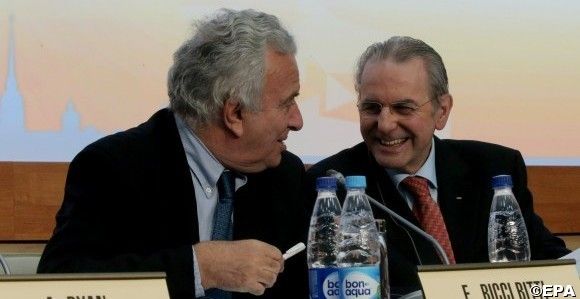ITF Accused Of Subterfuge
 ITF Accused Of Subterfuge
ITF Accused Of Subterfugeepa03722030 The Association of Summer Olympic International Federations (ASOIF) President Ricci Bitti (L) speaks with International Olympic Committee (IOC) President Jacques Rogge (R) at a joint meeting of the IOC Executive Board and ASOIF during the SportAccord Convention 2013 in St.Petersburg, Russia 29 May 2013. IOC Executive Board meet with Olympic Summer and Winter International federations to exchange views and hear about preparations for the forthcoming Sochi 2014, Rio de Janeiro 2016 and PyeongChang 2018 Olympic Games. EPA/STRINGER |
The International Tennis Federation has been criticized for declaring Marin Cilic withdrew from Wimbledon because of a knee injury when the body was fully aware the Croatian was in fact not allowed to compete because he was under investigation following a failed dope test.
Cilic was eventually handed a nine month suspension by the ITF for testing positive for the stimulant nikethamide, backdated to include the fortnight of Wimbledon. In the views of Simon Chadwick, a professor of sports business strategy at Coventry University in England, the subterfuge leaves tennis’ governing body in a very poor light.
“It looks like damage limitation on the part of the ITF, that they are trying to protect television contracts and sponsorships,” said Chadwick.
The ITF’s standpoint is they maintain a policy aimed at protecting the reputation of players in the eventuality they turn out to be innocent but during Wimbledon, the rumor mill was working overtime that Cilic had indeed failed a doping test and his former coach Bob Brett effectively admitted that was the case.
Chadwick added: “They’re trying to keep a lid on it and manage the news but in the social media age it’s very difficult to keep things quiet. It’s a dangerous strategy.
“With tennis coming under more scrutiny than ever from people interested in celebrity and rumor, authorities aren’t helping the sport’s reputation by conducting inquiries in private.”
According to Bloomberg News Agency , ITF spokesman Nick Imison said its anti-doping rules are drawn up with the men’s and women’s tours, and are constantly under review. Meanwhile Ben Nichols, a World Anti-Doping Agency spokesman in Montreal added that tennis is acting within world anti-doping guidelines that give sports federations “some flexibility in terms of disclosure” when athletes test positive for a banned substance.
Cilic, who insisted he inadvertently ingested the banned substance because he had been taking a similar glucose product for some time, maintains he will appeal against the decision to the Court of Arbitration for Sport.
He also stated that he was under considerable stress due to problems between his former coach Brett and his parents.
In the official findings of the ITF’s independent anti-doping tribunal, there is the admission: “He [Cilic] played and won his first round match at Wimbledon on 24 June. He has not played in a competitive match since.
“On 26 June his lawyers in Brussels responded on his behalf, voluntarily accepting a provisional suspension until a decision in the case, and waiving his right to analysis of the B sample. He withdrew from Wimbledon, citing a knee injury to avoid adverse publicity.”
However Cilic has released a statement denying he ‘feigned injury’, and pointing out he had a knee injury during Wimbledon this year.
Topics: 10sballs.com, Itf, Marin Cilic, nikethamide, Tennis, Tennis News, Wimbledon


10sBalls Top Stories
- Yeni Üyeler İçin En Cazip Bahis Bonusu
- Deneme Bonusları İle Eğlenceli Oyun Deneyimleri
- Güvenilir Bahis Siteleri: Bonus ve Güvenlik İncelemesi
- Reasons Behind the Increase in Sex Shops
- Reasons Behind the Increase in Sex Shops
- Reasons Behind the Increase in Sex Shops
- Casibom: Yaşayan Casinolar ve Bahisler Lider Platform
- Sea Star Casino: Play Games Without Registering Online
- JETZT DEN SWEET BONANZA SLOT GRATIS DREHEN
- Азартные игры с Мостбет Казино – испытайте удачу
- Çevrimiçi en iyi yuvalar: Hizmetinizde Karavan Bet Casino
- Top No Deposit Free Spins Offer for Canadians – December 2024
- Abe Bet Casino: Ücretsiz dönüşlerle heyecan hissedin
- Ünlü slotlar çevrimiçi kumarhanelerde başarı bet giriş ücretli formatta
- BasariBet Casino Giriş – En Güzel Canlı Casino Oyunlarına Katılın





Cilic Doping Case: “authorities aren’t helping the sport’s reputation by conducting inquiries in private.” http://t.co/ZlY2qUBZgH